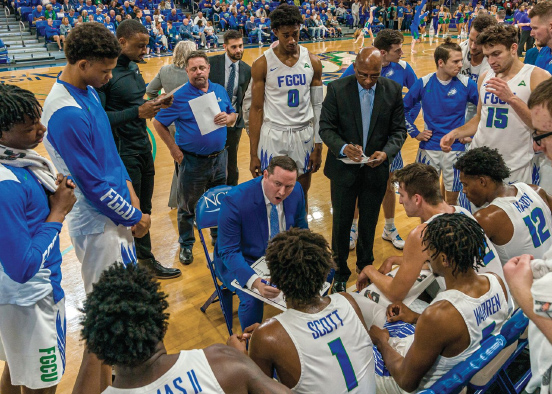An honest appraisal of any season that doesn’t go the way the home faithful hoped can’t ignore harsh realities, and for the FGCU men’s basketball team there were plenty in 2019-20.
But the collection of people who share optimism for the future of the once – and still – proud program is arguably just as meaningful after a second consecutive rough rebuilding year. Those include one of the battle-hardened former veterans the Eagles so clearly missed this season and a former rival coach who recently turned lean years into March riches.
“The more you win, the more patient people are,” said FGCU head coach and longtime former assistant coach Michael Fly, whose second season in charge of the program resulted in a second consecutive losing record and first-round defeat in the ASUN Conference tournament.
“Nobody wants to hear this because of all the success that we’ve had. But this is not the same situation we’ve ever been in before,” Fly said. “It has been a complete rebuild. We have had to turn the program over from a personnel standpoint for a variety of reasons.”

Outside the FGCU locker room shortly after a 78-73 overtime loss at home to North Alabama in the regular-season finale – one of 10 losses by nine points or less during the 10-22 campaign – former Eagles stalwart Zach Johnson had a reassuring reminder for Fly.
“He said, ‘You’re close. You just don’t have the experience you’re used to having,’” said Fly, who started two juniors, two sophomores and one freshman in FGCU’s 68-63 loss at Lipscomb in the ASUN tournament, another game in which FGCU held a late lead it couldn’t secure. “That’s what I’ve tried to explain to people: my family, friends, fans. For years and years we had the most-veteran team in the league. And for the last two years we’ve had one of the most inexperienced teams in the league. We’re just fighting an uphill battle. Next year going forward we won’t be returning (just) three guys that played the previous year.”
After going 23-12 in 2017-18 – the last of Joe Dooley’s five seasons at FGCU and the program’s sixth straight with at least 20 wins – the Eagles have faced major roster turnover and playing rotation upheaval each of the last two seasons due to graduations, transfers and injuries.
The Eagles slid to 14-18 in what was expected to be a transitional year in 2018- That squad lost its top three scorers, four of its top five scorers and its top four rebounders from the prior campaign, then saw four starters or rotation members sidelined by major injuries during the year.
Then after FGCU entered this season losing seven of the 10 players who saw significant minutes a year before, injuries impacted at least four primary contributors during the season. FGCU again ended up having to turn to untested newcomers or youngsters with little experience together.
While the roster instability showed itself in the number of narrow defeats, the Eagles are optimistic about having a sizable young nucleus returning for the first time in Fly’s tenure.
“The two years I’ve been here we’ve had two completely different teams,” said sophomore guard Caleb Catto, a Cape Coral native who led the Eagles with 12.7 points a game this season and was the only FGCU player to start all 32 games. “If you have the same lineup guys feel more comfortable in their roles. It’s easy to say that by game 30 they should have everything figured out. But I think with a bunch of new pieces and a bunch of young guys it’s a growing process all year long. This thing is a process. It takes time.”
After this season, four players announced they are transferring. But three – senior wing Christian Carlyle, junior center Brian Thomas and redshirt sophomore guard Malik Hardy – were limited or didn’t play at all because of injuries after being expected to play major roles. The fourth is sophomore guard Zach Scott, who was third on the team with 10.8 points a game.
That leaves a promising returning core that includes Catto, rising senior point guard Jalen Warren, rising senior center Justus Rainwater, rising sophomore forwards Dakota Rivers and Qwanzi Samuels, and rising sophomore guard Cyrus Largie, a late-season starter.
“My hope is next year for the first time since I’ve been the head coach it won’t be, ‘Hey let’s get a roster sheet out to figure out who everybody is.’ And that’s what it’s been the first two years,” Fly said. “Unlike year one or two, we don’t have to hit reset.”
Late in the season, even as FGCU was still struggling to win close games, former Lipscomb coach Casey Alexander was among those calling to acknowledge the Eagles’ progress. In his first three seasons rebuilding a Bisons program that had lingered in the bottom half of the ASUN, Alexander’s teams were a combined 41-53 without a top-three finish in the league. In his last three seasons before he left after the 2018-19 season for another Nashville school, Belmont, Lipscomb was a combined 72-31. The Bisons won at least 20 games each year, finished second or better all three years in the ASUN and earned the school’s first NCAA tournament bid.
“He said, ‘Hey man, you’re doing things the right way. It’s going to turn out the way you want it to. You just have to continue to build it,’” Fly said. “He said, ‘Remind all those people that we were not very good at Lipscomb for a long time, then all of a sudden we were the best team in the league. But it took years and years of building that program.’”